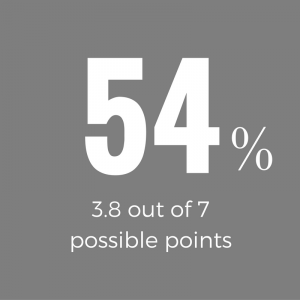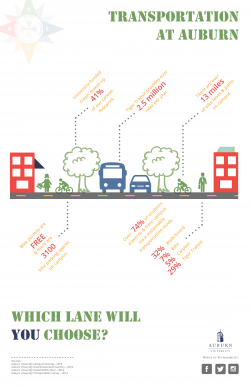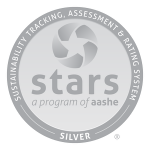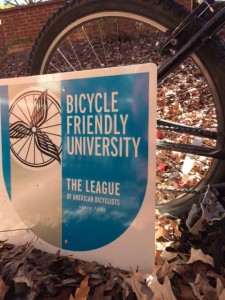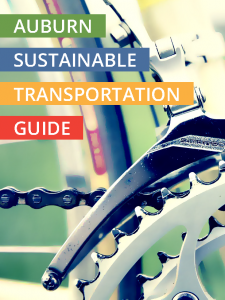Transportation |
Practices
Auburn University recognizes the benefits associated with more sustainable transportation. We make the campus accessible for students, faculty, staff, and visitors through many convenient transportation options that reduce environmental impacts, as well as promote personal well-being and cut transportation costs.
SPOTLIGHTS
Profile
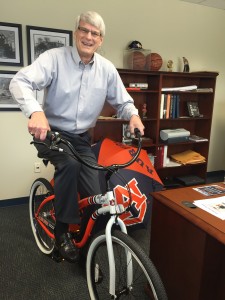
Don Andrae considers his responsibility to be much more than just parking.
When Don Andrae, Auburn University Director of Parking Services, graduated from Columbus State University in computer science in 1970 there were no computer systems that could guarantee you a parking spot while reducing carbon emissions. Don may not have envisioned this software in 1970, but he did have an open mind for new ideas, an eye for talent in people, and determination for progress.
Today we live in a technological age that has allows us to live our daily lives at a faster pace. We want to get where we’re going now, instead of later. Arriving at our destinations faster often times means taking a mode of transportation that has environmental costs. Is it possible for us to get to our destinations just as quickly while being mindful of sustainability?
Project
Thanks to the efforts of Parking Services, we can officially welcome you to the War Eagle Bike Share. We hope you’ll create an account, grab a helmet, and hop on for a spin around our Bicycle Friendly University and the loveliest village on the Plains!
Points of Performance
2016 REPORT CARD
The transportation credits in AASHE STARS “seek to recognize institutions that are moving toward sustainable transportation systems,” which helps mitigate impacts from greenhouse gas emissions and other air pollutants, as well as from extraction/production/distribution. In addition, bicycling and walking provide human health benefits and help prevent further damage to waterways.
Below you can find out more about the specifics of Auburn’s performance in each of the credit areas, as well as how our efforts compare to those of other doctoral institutions who have also completed the STARS 2.0 assessment. *
OP-18: Campus Fleet 0.06/1.00
This credit recognizes institutions that use cleaner fuels and fuel-efficient vehicles. Institutions can help shape markets by creating demand for and enhancing the visibility of more efficient vehicles and cleaner fuels that reduce greenhouse gas emissions and improve local air quality. While other credits address the climate impacts of fuel usage and the replacement of motorized vehicles with non-motorized vehicles, this credit recognizes the purchase and use of fuel efficient and alternative fueled vehicles.
OP-19: Student Commute Modal Split 1.48/2.00
This credit recognizes institutions where students use preferable modes of transportation to travel to and from the institution. Commute modal split is a common measure used to evaluate the sustainability performance of a transportation system. Using alternative modes of transportation helps reduce local air pollution and GHG emissions. Walking and biking offer health benefits as well.
OP-20: Employee Commute Modal Split 0.26/2.00
This credit recognizes institutions where employees use preferable modes of transportation to travel to and from the institution. Commute modal split is a common measure used to evaluate the sustainability performance of a transportation system. Using alternative modes of transportation reduces local air pollution and GHG emissions. Walking and biking offer health benefits as well.
OP-21: Support for Sustainable Transportation 2.00/2.00
This credit recognizes institutions that support active transportation and commuting alternatives for its students and employees. Encouraging more sustainable modes of transportation and offering programs to reduce commuting helps decrease local air pollution and greenhouse gas emissions.
Collectively these efforts place us squarely in the 2nd quartile, when compared to other doctoral institutions that have completed the STARS 2.0 assessment.

* Language adapted from the official STARS 2.0 Technical Manual.
2016 PRACTICES IN PLACE
At the time of our AASHE STARS submission, transportation efforts on campus included:
Auburn Outdoors Bike Shop & Trips
Bike to Work Week
Carshare Program
GOTCHA Ride
Jaunt
Lee-Russell Public Transit
Night Security Shuttle
Ride Amigos
Tiger Transit
Travel with Care Campaign
War Eagle Bike Share
KEY PARTNERS AND PLANS
The transportation successes of Auburn wouldn’t be possible without the foresight and determination of many units across campus and in the community. We hope you’ll choose to learn more about these important partners and the services and programs they offer the Auburn Family.
Auxiliary Services — Parking Services
Campus Recreation & Wellness — Auburn Outdoors
College of Engineering — Department of Civil Engineering
Department of Campus Safety & Security — Security Shuttle
Facilities Management — Campus Planning
Lee-Russell Council of Governments
The great work of these units is guided in part by Auburn’s Campus Master Plan and Climate Action Plan.
GET INVOLVED
Choosing more sustainable options for your own transportation modes can serve as a great start to making a difference, but you can also help improve our world by joining with others to work on these transportation challenges at a larger scale. Consider connecting with one of the following groups or academic units to meet others interested in working on these issues, too.
Organizations
Environmental Design Student Organization
US Green Building Council Chapter: Auburn University
Degree Options
2016 STARS Report Score
